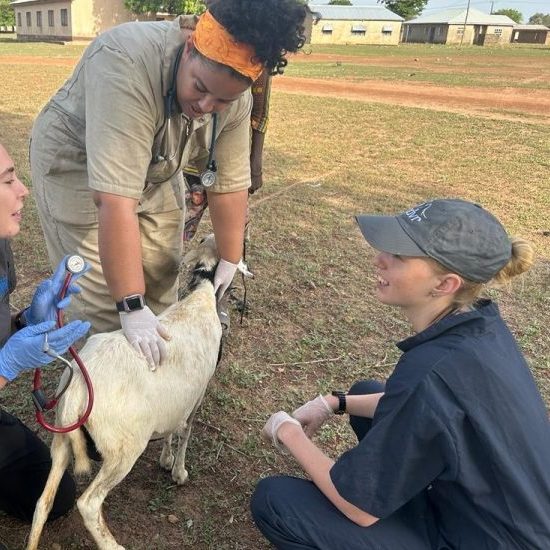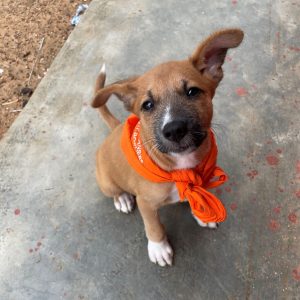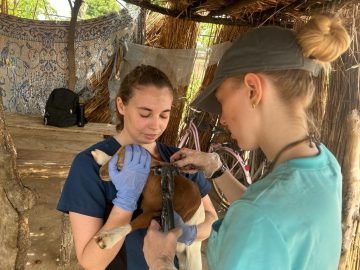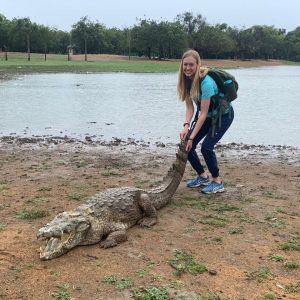Advancing Livestock Health in Ghana: Veterinarians Without Borders

About
| Name | Marley Blok |
| Title | Volunteer |
| Company | Veterinarians Without Borders |
| Grad year | 2023 |
| Program | Bachelor of Science in Applied Biology |
July 21, 2023 – Marley Blok is an alumna of the Applied Biology program (BSc 2023) and currently volunteers with Veterinarians Without Borders in their Volunteers Engaged in Gender-Responsive Technical Solutions Program, or VETS for short. Working with local Ghanaian organizations, Blok’s goal is to create sustainable socioeconomic change in rural communities through improving health in animal production systems.
Blok’s work and research highlights the One Health Model, which she describes as, “an approach to sustainably balance and optimize the health of people, animals, and the environment. It is unique as it recognizes that the health of people, the environment, and animals are all interconnected and dependent on each other.”
What made you choose LFS and APBI as a program?
Growing up I was always surrounded by animals, and from that stemmed a passion to pursue veterinary medicine. When I was applying to universities I was looking for a program that involved animal science but focused on real world solutions. LFS provided just that! In my first year I took the core LFS classes, which emphasized the importance of food security in a global context. In my upper years the APBI program at UBC provided me with flexibility to design my degree. This allowed me to partake in experiential learning opportunities such as my practicum with the BC SPCA’s low income pet food bank.
What sort of work did you do at the BC SPCA?
I took a 6 credit practicum with the BC SPCA’s low income pet food bank known as Charlie’s! I assisted with the packaging and distribution of pet supplies, ie. food, collars, leashes etc., to marginalized pet owners in Vancouver’s Downtown Eastside. I was able to connect with pet owners and helped facilitate access to pet supplies and veterinary resources. It was an extremely rewarding experience and I would highly recommend this practicum to any future or current LFS students!

How did you first find out about the VETS program with VWB?
Surprisingly, it all started with a simple Google search! I had a deep interest in working with an organization dedicated to international development. Upon stumbling upon VWB’s website, and this VETS project I instantly recognized it as the perfect opportunity for me to actively participate in something that truly intrigued me.
What inspired you to work with VWB?
During my last year at UBC I began to reflect on my own values and realized I was looking to build upon the base of knowledge in animal welfare and One Health that UBC provided. I was also interested in learning more about international development, and how we can pursue it ethically. VWB’s Volunteers Engaged in Gender Responsive Technical Solutions (VETS) project interested me as it aims to sustainably improve the economic and social well-being of the world’s most marginalized people, particularly women and girls, while allowing me to grow my technical animal skills. I really liked how the program was developed in conjunction with VWB’s local partners, so we could ensure that we are directly addressing the needs of the community. I also wanted to be able to partake in a project that is sustainable, and could be continued after our placement was completed.
What are you working on right now?
Currently I am in the Upper East region of Ghana living in a community called Yua. We are partnered with one of VWB’s on the ground local partners called the Ghana Poultry Network (GAPNET) and are utilizing the One Health Model to foster sustainable development in the animal production system and enhance the social and economic well-being of women farmers. We have just completed a vaccination campaign for sheep and goats, vaccinating against PPR.

PPR is also known as Peste des Petite Ruminants. It is a virus spread between direct contact of animals. There is no official treatment for PPR and it often results in death of the animal. Unfortunately, PPR is a leading cause of death in small ruminants (goats and sheep) in Ghana, and causes farmers great economic loss.
Working with the local Community Animal Health Workers, para-veterinarians, and veterinary officers we vaccinated over 5000 animals across 13 communities in Ghana’s Upper East Region. Alongside my peers, I am participating in training sessions for women farmers with a particular focus on emphasizing biosecurity and animal husbandry techniques for poultry and small ruminants, aiming to educate 300 women. Additionally, I am helping conduct a One Health research project that evaluates the impact of Community Animal Health Workers (CAHWs) on disease surveillance in the Northeast region of Ghana, specifically concerning production animals.
What advice would you give to new students about how to create change in communities?
The biggest piece of advice I could give to new students looking to create change in their community is to start with a vision of the change you desire. Find a connection, build trust with your peers and open yourself to learning through the process of change. Change isn’t linear and it happens both ways. It can be hard and take time.

Do you have a favourite food or activity in Ghana right now?
Since being in Ghana I have had the opportunity to try many local foods. My favourite so far has been Red Red with Fried Plantains! In our free time we have had the opportunity to visit many local sites. We went to Mole National Park where we went on safaris and saw elephants, warthogs, antelopes and more! The people in Ghana are the most welcoming people I’ve met. We are living next door to a large family, who have helped us adjust to the rural living, and there are many children around who are always looking to play with us and keep us entertained!
More about Veterinarians Without Borders and their VETS program
As part of Veterinarians Without Borders’/Vétérinaires Sans Frontières’ (VWB/VSF) VETS (Volunteers Engaged in Gender-Responsive Technical Solutions) program, the Young Volunteer Program (YVP) provides university students and recent graduates with strongly supported international volunteer placements. The YVP program is dedicated to improving food security and the livelihoods of smallholder farmers in the global south, while also providing students with opportunities to learn and grow in a cross-cultural setting while contributing to the mission of VWB/VSF.
These placements contribute toward the VETS program objectives and offer additional support to volunteers through ongoing technical training and guidance from experienced supervisors. Placements are typically 8-12 weeks and located in Cambodia, Ghana, Kenya, Laos, Senegal, and Vietnam.
Tagged with: 2023, Alumni, Applied Animal Biology, International